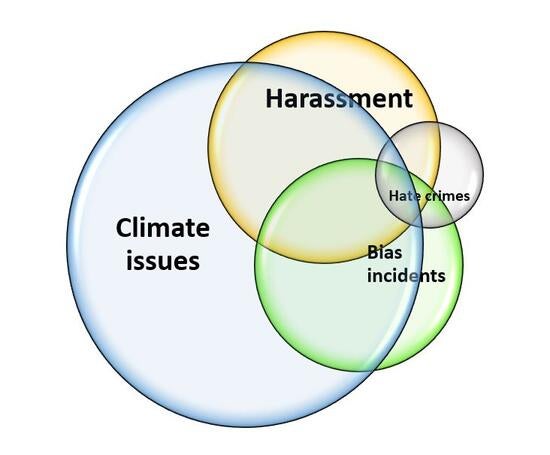
Office of Civil Rights
Effective April 14, 2025, our new office location in Hinderaker Hall, Suite 1100, is open Monday through Friday, 8:00 AM - 4:30 PM and these hours include our non-appointment walk-in hours from 9:00 AM - 4:00 PM. To schedule an appointment, please contact us at civilrights@ucr.edu.
The University is committed to non-discrimination, equal employment and affirmative action. UCR respects the rights of all members of the campus community to equal opportunity and freedom from discrimination or harassment based on any Protected Category:
- race, color, or ethnic origin
- citizenship, national origin, or ancestry (including caste)
- religion
- sex (including pregnancy, childbirth, lactation or related conditions), gender, gender identity, gender expression, gender transition, sexual orientation, or marital status
- disability (physical or mental), medical condition, or predisposing genetic information
- age (over 40)
- veteran or military status.
The Office of Civil Rights (OCR) is dedicated to protecting these rights by:
- raising awareness of the UC's values and policies
- responding to complaints and grievances of discrimination, harassment and retaliation
- implementing the UC Policy on Sexual Violence and Sexual Harassment (SVSH) and Anti-Discrimination Policy
- overseeing compliance with civil rights laws including the Americans with Disabilities Act and Section 504 of the Rehabilitation Act, Title VII, Title VI, and Title IX
- coordinating campus equal opportunity and affirmative action programs and producing the affirmative action plans.
You may contact us:
- By phone at 951-827-7070
- Email civilrights@ucr.edu
- Contacts Page Link
MAKE An online report of discrimination, harassment, bias, hate, sexual violence, or retaliation
Filing a Report or Complaint
The Office of Civil Rights responds to reports and complaints of discrimination, harassment, retaliation, and other Prohibited Conduct under the Anti-Discrimination Policy and the SVSH Policy. You may also report incidents of bias, hate and intolerance.
Discrimination is adverse, unequal treatment, such as a personnel action, based on a Protected Category.
Harassment is a form of discrimination, where the adverse treatment is unwelcome conduct based on a Protected Category that is so severe, persistent, or pervasive that it creates a hostile environment.
Retaliation is adverse action taken against someone for filing a complaint, participating in a complaint resolution process, or engaging in another protected activity.
The full definitions are provided in the Anti-Discrimination Policy.
To file a report or complaint, including anonymously (if desired):
make an online report of discrimination, harassment, bias, hate, sexual violence, or retaliation
Your report will be promptly reviewed by Office staff. Typically, we will reach out to you or the person identified as having experienced the Prohibited Conduct with information and resources and to connect for an intake meeting if appropriate. Our flowcharts and FAQs provide more information about our assessment and response process.
This reporting form may also be used to report violations of the SVSH Policy; visit the Title IX at UCR website to learn more about the SVSH Policy and programs.
External Reporting Options
UCR encourages students, faculty, and staff to contact the Office of Civil Rights with complaints and concerns, so that we have the opportunity to address the concern. We also provide information about how you may report discrimination, harassment (including sexual violence) and retaliation to regulatory entities, outside of UCR.
-
Options for Students
Students may file complaints with the U.S. Department of Education’s Office for Civil Rights (OCR). OCR has a website that explains how to file a discrimination complaint. Other reporting options include:
- U.S. Department of Education Office for Civil Rights, Lyndon Baines Johnson Department of Education Building, 400 Maryland Ave., SW, Washington, DC 20202-1100 or ocr@ed.gov or (800) 421-3481, 800-877-8339 (TDD), or
- U.S. Department of Education's San Francisco Office: (415) 486-5555, or ocr.sanfrancisco@ed.gov.
If you are a student employee and your complaint relates to your role as an employee, the options for employees may also be available to you.
-
Options for Employees
Employees may file complaints with
- the California Civil Rights Department (CRD) by using one of the three complaint methods described on their website.
- the U.S. Equal Employment Opportunity Commission (EEOC), as explained on the EEOC's website. The local EEOC office is located at Roybal Federal Building, 255 East Temple St., 4th Floor, Los Angeles, CA 90012. The EEOC encourages complainants to schedule an intake appointment online using their portal.
- the U.S. Department of Education Office for Civil Rights, as described on their website. Complaint options include online, by mail or phone at: U.S. Department of Education Office for Civil Rights, Lyndon Baines Johnson Department of Education Building, 400 Maryland Ave., SW, Washington, DC 20202-1100 or ocr@ed.gov or (800) 421-3481, 800-877-8339 (TDD), or through the Department’s San Francisco Office: (415) 486-5555, or ocr.sanfrancisco@ed.gov.
-
Options for Residents and Fellows (UCR SOM and UCR Health)
Residents and Fellows may file a complaint related to a medical education program (for example, for failure to prevent or appropriately respond to sexual harassment) with the Accreditation Council for Graduate Medical Education (ACGME).
-
Patients
Patients may file a complaint with the U.S. Department of Health and Human Services, Office for Civil Rights, electronically through the Office for Civil Rights Complaint Portal , or by mail or phone at: U.S. Department of Health and Human Services 200 Independence Avenue, SW Room 509F, HHH Building Washington, D.C. 20201 1-800-368-1019, 800-537-7697 (TDD). Complaint forms are available online.
Complaints may also be made to the California Department of Public Health’s Regional Office at 3901 Lennane Drive, Suite 210, Sacramento, CA 95834, (916) 263-5800, (800) 554-0354, (916) 263-5840 (fax).
Additionally, patients can file a complaint against a licensed medical professional, including physicians, nurses, psychologists and others through the California Department of Consumer Affairs. They can also visit this Consumer Affairs website, which will allow them to access websites to file complaints about any licensed professional in the State of California.
Rights, Options and Resources
for those who have experienced harassment or discrimination
Do you have questions about sexual violence or harassment based on sex, gender, sexual orientation? Visit the titleix@ucr website
Hate and Bias Incidents
Policies and Procedures
UC and UCR policies and procedures relating to discrimination, harassment, and sexual violence

